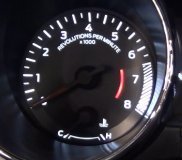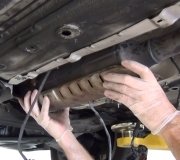Hi Joe,
Thank you for that detailed answer. I have read both the links you sent me, and I have to say I still don't see it. I'm a computer programmer, so logic and identifiable patterns rule my life. If the problem is in the catalytic converter, then there must be a pattern to be found. So far, the only pattern I have is that driving for a few minutes under 2,000 rpm's always triggers the problem. No bumps, no sharp corners, simply driving at low speeds.
So I went out and did a few tests:
First, I got under the car with a rubber hammer and tapped the converter a few times to see if I could identify any loose parts knocking about inside it. I couldn't.
Then I drove it full speed uphill (idea was to force it into maximum effort). It just flew up the hill as if nothing was wrong (what a joy!). Then I drove around for a few miles at low rpm to trigger the loss of power and tried to get up the same hill.... It barely made it, at a top speed of 20 mph (earlier I reached the top of the hill at almost 10 0mph).
Then I stopped the car and waited 10 minutes. When I started it was back to normal. I let it idle for 5 minutes and it triggered the problem again. So slow driving and idling both trigger the problem. But driving fast, always keeping revs above 3000 never triggers it.
For it to be the converter, according to your first link, and because I don't get any error codes, it could only be if a piece had broken off and was randomly causing this loss of power. This does not seem to be the case. There's nothing random here since I can replicate the problem every time I want.
The fuel build up seems more plausible in this case, but as I said before, no smoke, no excessive fuel smell, no backfiring (in my mind, if fuel was building up in a cylinder and then released, I should get something similar to a backfire)...
I also posted this question on matthew's volvo site, and I'm being advised it could be the Turbo Control Valve. Does this make sense to you?
I'm a smart-ish (in a problem-solving kind of way) and very logical guy, and have always done my own mechanics ever since I got my first car 28 years ago, but I am by no means a mechanic. I manage to do this by googling the symptoms, checking out all the answers and then doing a few tests and using logic to identify the problem and not being afraid to take things apart and look at them. In this case, according to what I wrote, the TCV could make sense, but I feel that's an answer based on the fact that I mentioned the Turbo wasn't engaging. This may not be true. It feels like the turbo isn't engaging, but I can't be sure. Maybe the turbo is working fine all the time and the problem is somewhere else.
In my mind, if the Turbo does not engage, I'll have less air in the chambers. With less air flowing through, the MAF will report back and tell the ECU to cut down on the fuel (right?). So the symptoms of a non-working Turbo would be similar to not pressing the accelerator pedal. This feels like what is happening. Even when I floor it, the speed builds up really slowly, as if I'm accelerating as gently and as slowly as possible, until it reaches a point where it seems the car is too heavy to be able to build up more speed (around 20mph when going up that hill). If I go downhill, the sheer weight of the car helps it build up more speed, but also very slowly.
My car does not have a turbo boost gauge, so I have set up and ELM127 OBD2 reader and installed Torque Pro on my phone. I will drive it around later while monitoring the turbo pressure. Also going to try and test the TCV by bypassing or blowing through one of the lines (as described here:
https://www.matthewsvolvosite.com/forums/viewtopic.php?t=63924).
I will report back with my findings.
Thank you again, Joe.
Stay safe.
Simon
Saturday, March 28th, 2020 AT 3:11 AM




